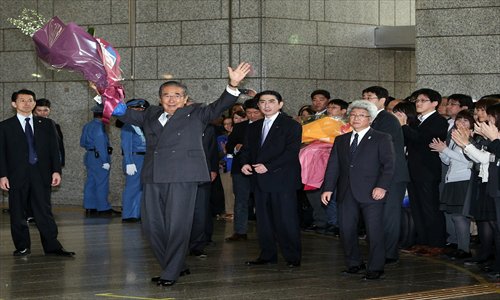Is right way the wrong way?

Shintaro Ishihara, who formally stepped down as Tokyo governor last week and announced his plan to form a new political party, met Saturday with Osaka Mayor Toru Hashimoto to discuss how this new party might cooperate with Hashimoto's Japan Restoration Party in the next general election.
The meeting between Ishihara and Hashimoto, both known for their ultra-nationalist views, came as the ghost of a snap general election looms large. Japanese Prime Minister Yoshihiko Noda is widely expected to call for an election before the end of the year.
Analysts said Ishihara aims to create a third major political force in Japan outside the Liberal Democratic Party (LDP) and the ruling Democratic Party of Japan (DPJ) by tapping into public discontent and rallying right-wing parties across the country.
Such an alliance, if formed, would definitely move Japan's political atmosphere further toward the right.
Political vacuum
Ishihara, 80, quit his job without completing his fourth term as Tokyo governor but said he would run for parliament in the next general election.
At a press conference in Tokyo, Ishihara said he would try to do nationally everything he had been striving to do for Tokyo, vowing to "fix the inflexible rule of the central government bureaucrats" as well as the issues facing Japan's economy.
Having been in power for more than three years, the DPJ has failed to convince the Japanese people about its differences with the LDP.
"The Japanese people are frustrated and have a deep mistrust toward the DPJ, which they once saw as their big hope for saving the economy. The DPJ is likely to be punished for this in the general election and lose power," Chen Youjun, an associate research fellow on international political economics with the Shanghai Institutes for International Studies, told the Global Times.
"The major reason why Ishihara has decided to form a new party now is that he saw a 'political vacuum' in Japan," Geng Xin, deputy director of the Tokyo-based JCC Japan Research Institute told the Global Times.
Other political forces in Japan have seen this opportunity as well and will also seek to take advantage of it, Geng added.
Ellis Krauss, a professor at the UC School of International Relations and Pacific Studies, said another reason that might have influenced Ishihara's decision is that his eldest son, former LDP secretary general Nobuteru Ishihara, lost the LDP's election last month.
"Ishihara obviously would not have wanted to form a new party if his own son was head of the LDP," Krauss told the Global Times.
Possible coalition
In an Asahi Shimbun poll from late October, only 13 percent of those surveyed planned to vote for Noda's DPJ in an upcoming election while 36 percent said they would side with the LDP.
In comparison, the support for Hashimoto's Japan Restoration Party, stood at just 2 percent.
"At the moment, the number of votes the newly-founded right-wing parties could win largely depends on whether more ruling DPJ members defect and if the LDP regains power," Geng said.
"Furthermore, as small party leaders, Ishihara and Hashimoto might have been successful in running local affairs in the past, but their ability in terms of the national economy and foreign policy may be in doubt," he added.
The DPJ, currently holding 247 seats in the lower house, is likely to lose but the LDP's resurgence will not be easy as it only holds 118 seats of its own.
This means no party may be able to score a simple majority of 261 seats in the lower house. Under those circumstances, the role of the small right-wing parties would be critical.
"My prediction would be that any new rightist party would have to join with the LDP in a coalition to gain power," Krauss said.
Dangerous elements
Both Ishihara and Hashimoto are infamous for their ultra nationalist and conservative ideas and comments.
In his press conference, Ishihara confirmed that he wants to abandon Japan's post-war peaceful constitution.
"There are several major contradictions that we hope the state itself will solve," he said. "The biggest is the Japanese constitution, which was imposed by the US occupying army, and is rendered in ugly Japanese."
"The creation of a more nationalist and conservative political force is worrisome because there has never been a successful extreme right-wing party in Japan since World War II," Krauss noted. "And the real danger of such a third power is that it would move the whole political spectrum in Japan further to the right."
Shinzo Abe, former Japanese prime minister and the new leader of the opposition LDP, has also expressed his wishes to ease restrictions on amending the Constitution.
The emergence of the more nationalist and conservative political force is a result of the long-time political right-wing leaning, Chen said, adding that the extreme views and behavior of nationalist and conservative politicians can be even more dangerous now given the delicate situation over Japan's territorial disputes with its neighbors.